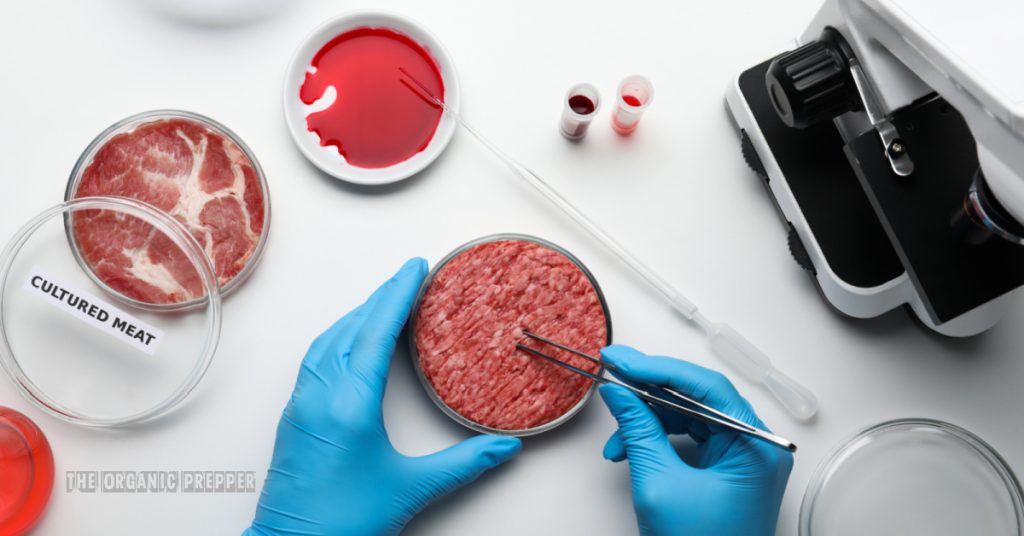by Daisy Luther, The Organic Prepper:

In case you’ve been hoping new foods like insects or lab-grown “meat” would go away on their own, lab-grown “chicken” has just been approved for sale by the USDA. Two companies, Upside and Good Meat, will be producing their meat-like product for high-end restaurants soon.
We wrote a few months ago about how consumers have not expressed interest in novel proteins. People around the world just want meat. However, this push to change our diet doesn’t seem like it’s going away, so let’s first look at what this product actually is and why we’re being told we should eat it.
TRUTH LIVES on at https://sgtreport.tv/
What is “lab-grown meat?”
Lab-grown meat, which will be labeled in stores as “cell-cultivated,” is a highly processed product that mimics the taste and texture of real meat. Proponents claim it will save the environment and end animal cruelty The truth, however, is a little more complicated.
Scientists begin by taking cell samples, either from live animals or from stored cellular lines, and place them in a soup of amino acids, sugars, salts, and other compounds needed by the animal tissue to replicate. In about three weeks, sheets of muscle tissue will be present in the fermentation tanks, and these are used to create dishes that look like they contain meat.
So, first of all, these are not vegan products. Scientists are taking actual animal cells and forcing them to replicate. Additionally, fetal bovine serum is one of the ingredients used in making these products. Ever heard of fetal bovine serum? It’s made with blood from calf fetuses. FBS is obtained by killing pregnant cows along with their calf fetuses, which means that not only is cell-cultivated meat not acceptable for vegans, but it’s also not acceptable for people that insist on humane animal husbandry.
And let’s think about what else is in the soup that feeds the growing animal cells. As explained by Alan Lewis in the Environmental Health Symposium last year, the soup in which the animal cells are cultured contains sugars and amino acids, which largely come from corn and soy. These crops are almost exclusively grown in huge monocultures with all their attendant health and environmental concerns.
And then we have the energy and industrial facilities required to produce this product. Even proponents of cell-cultivated meat admit that, as our energy grid currently stands, cell-cultivated meat has a far larger carbon footprint than any kind of livestock system.
They say this “meat” is ethical, but it’s not.
Trying to pretend that these food products are the ethical equivalent of a pastured, custom-processed chicken from the farm outside your metro area is incredibly misleading.
This strikes me in particular because, for years, I had a small side business producing truly pastured, custom-processed chickens. I still produce them for my own household.
Claiming industrially produced meat-like products are somehow more ethical than the chickens raised outside my back door, on feed produced two hours away and then processed behind my shed, is not only insulting but absurdly wrong. The carbon footprint going into my birds is minuscule compared to the carbon footprint involved in these energy-intensive industrial facilities.
And I’m willing to bet that my chickens taste a lot better, too.
So, why is lab-grown meat being pushed so hard?
Why the push for this stuff, especially when, as noted before, people don’t really want it?
We’ve already discussed the way in which driving conventional farmers and ranchers out of business will consolidate the food supply into the hands of a few very powerful players. And while I think those points are as valid as ever, there are a few other things I’d like to consider here.
This push away from animal husbandry, this drive to demonize conventional farmers and ranchers, has been taking its cues from the climate movement. And climate activists talk like scientists but think like religious zealots. A high percentage of the world’s population that considers itself educated has very little real connection with nature and its systems; they idealize nature while at the same time avoiding getting their hands dirty. This disconnection from living, breathing, eating, copulating, and killing nature makes them easy prey for whatever scheme the folks looking to capitalize on climate alarmism come up with.
Promoters of lab-grown meat are part of this. They have an emotional reaction to much of what goes into conventional meat production, and when you confront them about the use of a product like FBS, they just insist that they’re working on it, the usage is temporary, and a more ethical solution is just around the technological corner.
Maybe it is, and maybe it isn’t. There are so many trade secrets involved in these high-tech formulations that it’s actually pretty hard to find out what, precisely, goes into these highly bioengineered food products. What we do know is that these facilities are astoundingly expensive and complicated, and to produce cell-cultivated chicken at a scale even close to the current demand for chicken is completely unrealistic. But, to the true believer, that’s all beside the point because they operate on faith.
Read More @ TheOrganicPrepper.ca



